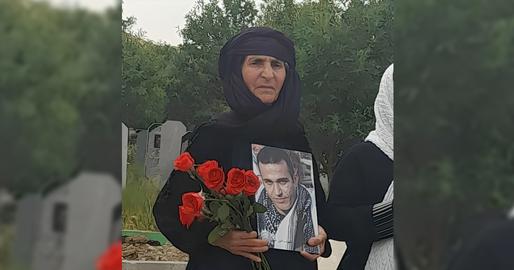Iranwire – Dayeh Sharifeh had six sons and two daughters. Her youngest son has been executed, while the oldest has been killed in suspicious circumstances.
Despite her frail health, the Kurdish septuagenarian stands as an unrelentless opponent to the use of the death penalty in Iran.
In the aftermath of the recent execution of four Kurdish political prisoners near Tehran, Sharifeh was detained twice in two days and forcibly relocated to her village in Dehgolan, Kurdistan province.
Authorities say she is barred from leaving the village, except for medical visits.
Her name is Sharifeh Zarini, but she is widely known as Dayeh Sharifeh.
Her son Ramin Hossein Panahi was executed in Tehran’s Evin prison in September 2018, alongside two other political prisoners – Zaniar and Loqman Moradi.
The bodies of the three men were never handed over to their families.
Throughout the years, Sharifeh has stood in solidarity with civil activists like Narges Mohammadi and the families of those killed by the Islamic Republic.
Her activism has made her a prominent figure in the fight against capital punishment in Iran.
As part of a “forgiveness” campaign, Sharifeh has been traveling to cities and villages to plead for the lives of convicts facing capital punishment, and saved many as a result.
When Ramin was under the threat of execution, she told the judge presiding over her son’s case: “Saving Ramin alone won’t matter because tomorrow you will put this rope around another young man’s neck. That’s why we oppose gallows and hanging ropes.”
In recent days, amid an alarming spike in executions of political prisoners, pictures of Sharifeh holding placards against the death penalty surfaced multiple times.
Sharifeh released a video message calling for the cancellation of death sentences against Vafa Azarbar, Mohammad Faramarzi, Pajman Fatehi and Mohsen Mazloum.
“Why Don’t You Just Die and Leave Us Alone?”
Her activism likely contributed to her brief detention on the same day four Kurdish political prisoners were executed.
Sharifeh, her daughters and other people were en route to Kamiyaran when she was apprehended by agents of the Sanandaj Ministry of Intelligence and taken to Sanandaj and then to their village.
Amjad Hossein Panahi, one of her remaining sons who lives abroad, recounted an incident where one of the intelligence agents from Sanandaj engaged in a verbal altercation with his mother, telling her, “Old woman, why don’t you just die and leave us alone? Why are you causing so much trouble and problems to us?”
Sharifeh replied calmly, “What you see is not me, it is Ramin’s soul that is alive in me. I have been dead for years. I’m here to witness you [dying] and be with the families you wronged.”
Panahi further said, “Yesterday [February 1], they visited the family of Mohammad Faramarzi in Dehgolan. After accompanying his mother, they intended to visit Pejman Fatehi’s family in Kamiyaran. However, on their way, Ministry of Intelligence forces traveling in three cars intercepted them and treated them disrespectfully.”
He added, “They arrested them, took them to Sanandaj, and officially informed them that they must return. They were then brought back to our village.”
According to Panahi, intelligence agents from Sanandaj said, “We have received orders from Tehran to restrict your activities. You are not allowed to leave the village for any activities or attend mourning ceremonies for executed people.”
Panahi stated that his mother had been instructed not to leave the village except for matters such as going to the hospital or the doctor.
“Under the Shadow of Execution, Imprisonment, Torture”
He also said that Sharifeh faced the specter of execution years before her 24-year-old son.
“Years before Ramin, my other brother Anwar, a prominent Kurdish activist, was arrested in 2006 and sentenced to death in 2007 over his affiliation with Komala,” he said, referring to the Komala Party of Iranian Kurdistan.
“Fortunately, thanks to the collective efforts by human rights organizations, the people of Kurdistan, as well as my mother’s relentless advocacy, Anwar was spared from execution after seven years and several months in prison,” he added.
“Since that time, our family has lived under the shadow of execution, imprisonment, torture and detention,” he recalled, mentioning the death of another brother, Ashraf, who was actively following Anwar’s case during the same period.
Ashraf’s lifeless body was found in 2017 on a rural road near Sanandaj. He had been run over by a car.
Panahi stated that while Anwar faced execution, Ashraf, a civil activist and member of the campaign to defend political prisoners on strike in Sanandaj prison, “was assassinated by the Ministry of Intelligence.”
Simultaneously, Ramin, who was still a teenager at the time, and his brother Afshin were detained.
“My mother had no other recourse to defend her children and her heart. Ramin, still young, had just been released from prison,” Panahi said. “The intense pressure forced him to travel to Iraqi Kurdistan. Upon his return to visit my mother, he was arrested and later sentenced to death.”
“A significant international campaign was launched against this verdict, and my mother officially entered the arena at that time to save her youngest child.
“Unfortunately, Ramin was executed, and now the sole purpose and solace for my mother is to oppose executions and do whatever she can for the prisoners’ families.”
Ramin was executed on September 8, 2018, after having endured months of torture and consistently denying accusations he had entered the country with weapons and fired 30 rounds of ammunition.
 Shabtabnews In this dark night, I have lost my way – Arise from a corner, oh you the star of guidance.
Shabtabnews In this dark night, I have lost my way – Arise from a corner, oh you the star of guidance.



